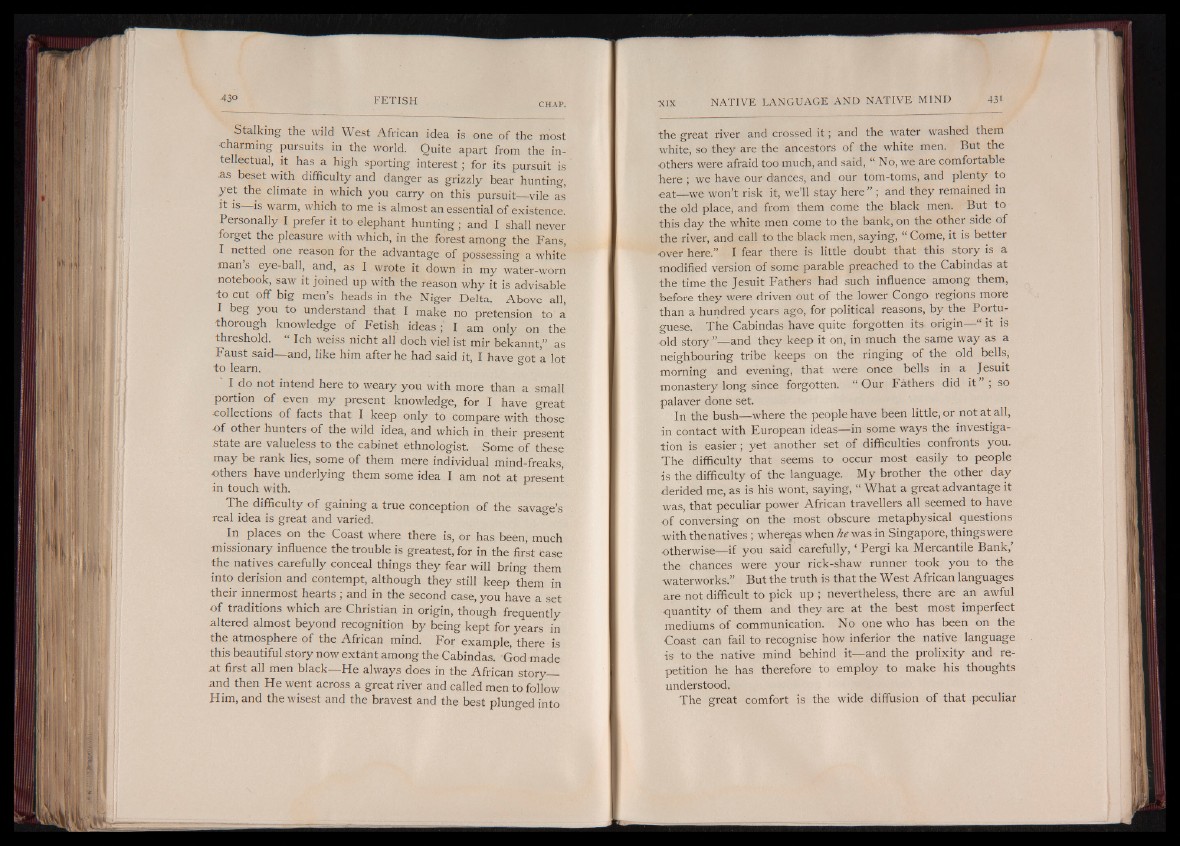
Stalking the wild West African idea is one of the most
•charming pursuits in the world. Quite apart from the intellectual,
it has a high sporting interest; for its pursuit is
as beset with difficulty and danger as grizzly bear hunting,
y et the climate in which you carry on this pursuit— vile as
9 *s *s warmi which to me is almost an essential of existence.
Personally I prefer it to elephant hunting; and I shall never
forget the pleasure with which, in the forest among the Fans,
I netted one reason for the advantage of possessing a white
xnan s eye-ball, and, as I wrote it down in my water-worn
notebook, saw it joined up with the reason why it is advisable
to cut off big men’s heads in the Niger Delta. Above all,
I beg you to understand that I make no pretension to a
thorough knowledge of Fetish ideas;' I am only on the
threshold. “ Ich weiss nicht all doch viel ist mir bekannt,” as
Faust said— and, like him after he had said it, I have got a lot
to learn.
I do not intend here to weary you with more than a small
portion of even my present knowledge, for I have great
collections of facts that I keep only to compare with those
c f other hunters of the wild idea, and which in their present
state are valueless to the cabinet ethnologist. Some of these
may be rank lies, some of them mere individual mind-freaks,
others have underlying them some idea I am not at present
in touch with.
The difficulty of gaining a true conception of the savage’s
real idea is great and varied.
In places on the Coast where there is, or has been, much
missionary influence the trouble is greatest, for in the first case
the natives carefully conceal things they fear will bring them
into derision and contempt, although they still keep them in
their innermost hearts ; and in the second case, you have a set
o f traditions which are Christian in origin, though frequently
altered almost beyond recognition by being kept for years in
the atmosphere of the African mind. For example, there is
this beautiful story now extent among the Cabindas. God made
at first all men blacks He always does in the African story
and then He went across a great river and called men to follow
Him, and the wisest and the bravest and the best plunged into
the great river and crossed i t ; and the water washed them
white, so they are the ancestors of the white men. But the
others were afraid too much, and said, “ No, we are comfortable
here ; we have our dances, and our tom-toms, and plenty to
eat we won’t risk it, we’ll stay here ” ; and they remained in
the old place, and from them come the black men. But to
this day the white men come to the bank, on the other side of
the river, and call to the black men, saying, “ Come, it is better
over here.” I fear there is little doubt that this story is a
modified version of some parable preached to the Cabindas at
the time the Jesuit Fathers had such influence among them,
before they were driven out of the lower Congo regions more
than a hundred years ago, for political reasons, by the Portuguese.
The Cabindas have quite forgotten its origin— “ it is
old story ”— and they keep it on, in much the same way as a
neighbouring tribe keeps on the ringing of the old bells,
morning and evening, that were once bells in a Jesuit
monastery long since forgotten. “ Our Fathers did i t ” ; so
palaver done set.
In the bush— where the people have been little, or not at all,
in contact with European ideas— in some ways the investigation
is easier; yet another set of difficulties confronts you.
The difficulty that seems to occur most easily to people
is the difficulty of the language. My brother the other day
derided me, as is his wont, saying, “ What a great advantage it
was, that peculiar power African travellers all seemed to have
o f conversing on the most obscure metaphysical questions
with the natives; whereas when he was in Singapore, things were
otherwise— if you said carefully, ‘ Pergi ka Mercantile Bank,’
the chances were your rick-shaw runner took you to the
waterworks.” But the truth is that the West African languages
are not difficult to pick up ; nevertheless, there are an awful
quantity of them and they are at the best most imperfect
mediums of communication. No one who has been on the
Coast can fail to recognise how inferior the native language
is to the native mind behind it— and the prolixity and repetition
he has therefore to employ to make his thoughts
understood.
The great comfort is the wide diffusion of that peculiar